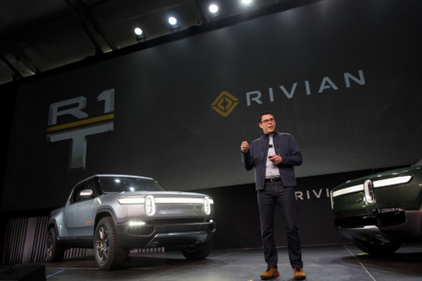Rivian Automotive will make its market debut on Wednesday, in what is expected to be one of the biggest IPOs of the year.
The electric vehicle maker on Tuesday valued its stock above the expected range of $ 78 per share to raise around $ 11.9 billion. At that offer price, Rivian is valued at $ 66.5 billion, making it slightly less valuable than traditional auto giants like GM and Ford.
The stock will be listed on the Nasdaq under the symbol RIVN.
Rivian, which is backed by Amazon and Ford, has generated a lot of interest from investors looking to capitalize on the rapidly growing electric vehicle market.
Amazon owns a 20% stake in Rivian. He invested more than $ 1.3 billion in the young automaker before its IPO. Ford and Cox Automotive each hold more than 5% of Rivian’s capital.
While Ford executives have touted their relationship with Rivian as a strategic investment, the company’s Lincoln division previously planned to build electric vehicles with the upstart. These plans were scrapped during the emerging pandemic.
Amazon, which is converting its fleet to vehicles running on renewable energy, revealed in 2019 that it was purchasing thousands of vehicles from Rivian. More recent documents show that Amazon has exclusive rights to Rivian’s battery-electric delivery vehicles for at least four years, with a right of first refusal thereafter.
Amazon has ordered 100,000 vehicles to be delivered by Rivian by 2030. The companies plan to have 10,000 new Rivian-Amazon delivery vehicles on the road by next year.
Besides its fleet business, Rivian has beaten Tesla, GM and Ford in the market with a fully electric pickup, the R1T. It plans to launch a battery-powered electric SUV for seven passengers, the R1S, in December, according to an October prospectus.
Rivian CEO RJ Scaringe, who has a PhD. of the Sloan Automotive Laboratory of the Massachusetts Institute of Technology, founded Rivian in 2009. The company’s headquarters are in Irvine, California, and it has a vehicle assembly plant in Normal, Illinois.
The company says its Illinois plant has the capacity to produce up to 150,000 vehicles per year. About 65,000 of these are expected to be pickup trucks and R1 SUVs, and about 85,000 are expected to be the company’s commercial RCV delivery vans, Rivian said in financial documents.
But Rivian is still a relative upstart, and he hasn’t started to generate any real income. Rivian said in his prospectus that he will lose up to $ 1.28 billion in the third quarter, while revenues will go from zero to $ 1 million.
It has not yet produced its electric vehicles in very large volumes. It’s unclear how quickly it can ramp up production, especially amid the global chip shortage and port constraints that have plagued automakers this year.
Rivian said in an amendment to his S-1 record that he had a backlog of preorders for 55,400 R1T and R1S vehicles from customers in North America and planned to deliver them by the end of 2023.
New legislation pending President Joe Biden’s signature will provide $ 7.5 billion in federal grants to build a nationwide network of electric vehicle charging stations, and Rivian could benefit. Scaringe pointed out that Rivian vehicles are ideal for people with a sense of adventure and a love of the outdoors. As such, the company places charging stations in remote destinations, such as state or national parks.
Rivian had 6,274 employees at the end of June of this year.
One of its former executives recently sued Rivian by accusing the company of having a “toxic brother culture”, thereby falsely terminating his employment and in doing so costing him “millions of dollars in equity capital. not acquired on the eve of the company’s IPO “.
In the lawsuit, Laura Schwab, who previously headed Aston Martin’s U.S. operations, also claims the company dismissed concerns it raised about Rivian’s business, including its “ability to keep its promises to investors.”
Published first at UK Time News









